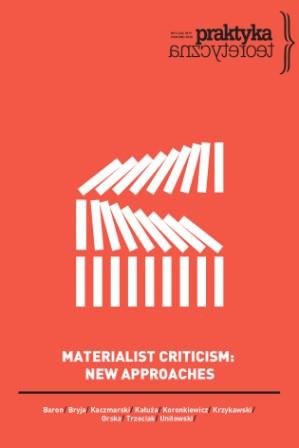Critique. Division. An Archaeology of Separation and a Salvaging Etymology
Critique. Division. An Archaeology of Separation and a Salvaging Etymology
Author(s): Katarzyna TrzeciakSubject(s): Gender Studies, Studies of Literature, Aesthetics, Hermeneutics, Theory of Literature
Published by: Uniwersytet Adama Mickiewicza
Keywords: Post-critique; hermeneutics of suspicion; symptomatic reading; affective criticism; subordinated knowledge;
Summary/Abstract: The goal of this essay is twofold: firstly, it is a description a post-critical tendency within the contemporary, Anglo-American humanities; secondly, it presents propositions which broaden the boundaries current in the post-critical current, which lead to the replacement of critical scientificity with an affirmation of everyday readerly affects. The claims regarding the rejection of a criticism based on suspicion, formulated by, among others, Rita Felski, accentuate the elite character of reading, the goal of which is the unveiling of the economico-political entanglement of the text as a product of historical reality. The distrust towards the surface of the text and the illusion of aesthetic autonomy, central for cultural studies, raised the critical attitude to the rank of an activity that is revelatory and privileged. The opponents of an unmasking criticism underline its limitations—unmasking reveals the ultimate source of every cultural production, the logic of capitalism, the total character of which leaves no chance for change. In defense of change, and in the hope of restoring to literature a widespread interest, there appear tendencies which bring back the individual experience of reading, the basis of which is to be aesthetic pleasure, freed from the historical context and its determinants. In the article, examples of such tendencies will be pointed out, as also will be their consequences caused by the elevation and universalisation of non-professional reading. The rejection of the political task of criticism leads to the questioning of its anti-systemic potential; in turn, the apotheosis of suspicion paralyses the postulative dimension of criticism. For this reason, in the last part of the essay, I propose going beyond oppositional conceptualisations in the direction of a criticism that is situated and material, and whose model, in my rendering, is subordinated knowledge.
Journal: Praktyka teoretyczna
- Issue Year: 2019
- Issue No: 34
- Page Range: 123-151
- Page Count: 19
- Language: English

